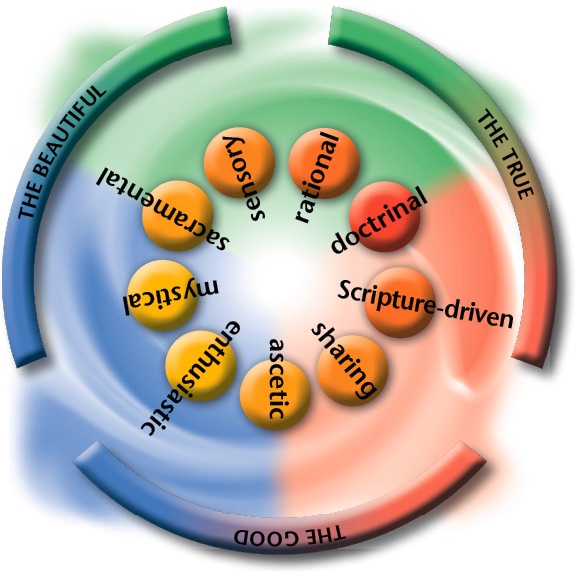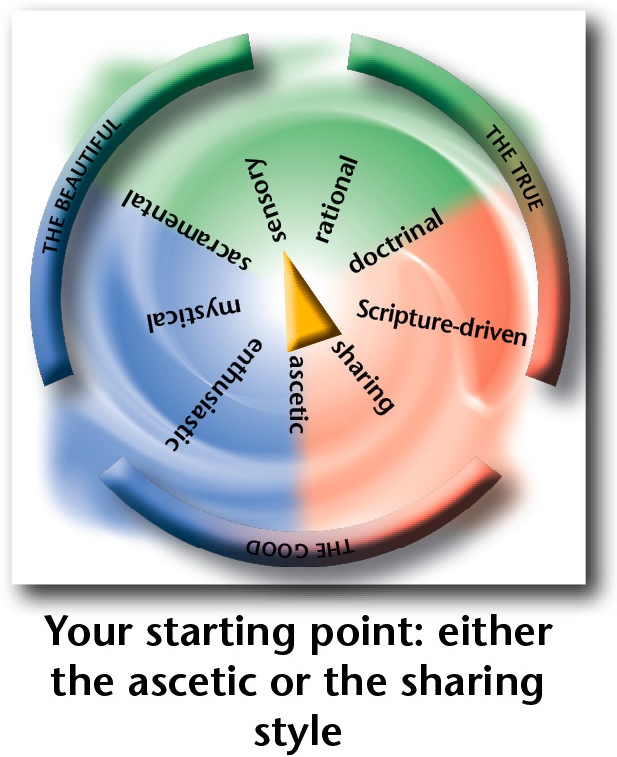What fascinates me about my doctrinal mentor Gene
G
ene calls himself “a fundamentalist in doctrine, an evangelical in attitude, and a liberal when it comes to methods.” Gene the liberal? That sounds like a combination to puzzle the mind. He gives an example. There was a professor from Talbot Seminary who visited him once and attended all three of his Sunday services. The first one was a traditional worship service, with hymn books, choir, robes, and Gene in a suit and tie. The second service was contemporary, with guitar and synthesizer, and Gene in a polo shirt and blue jeans. The third service was even more informal, Gene just wore pants. The professor commented, “I am so glad that Gene doesn‘t have four worship services.” For Gene, all of these expressions, while not being arbitrary, are changeable. However, the content of the gospel is not.
 Graphical representation of the doctrinal style: It is essential to understand the positioning of this style within the Trinitarian Compass. Christians with a doctrinal style should take into special consideration the two opposite styles (enthusiastic and mystical) as these throw light on the dark side of the doctrinal style.
Graphical representation of the doctrinal style: It is essential to understand the positioning of this style within the Trinitarian Compass. Christians with a doctrinal style should take into special consideration the two opposite styles (enthusiastic and mystical) as these throw light on the dark side of the doctrinal style.
On the one hand, the doctrinal style lies exactly on the interface between the green and the red style families; on the other hand, it is at the very center of the dogmatic style family. Depending on its leaning toward one of its two neighbor styles, it can manifest itself in a more rational (green) or more Scripture-driven variety (red). For Christians with a doctrinal style, it is most natural to express their spirituality through a clear demarcation of truth and heresy. The strength of this style is its focus on sound doctrine; the peril is its tendency toward a static concept of truth (dogmatism).
 For Christians with a doctrinal style the truth revealed in Scripture plays the decisive role in their spirituality. The focal point of this spirituality is that of constantly deepening our understanding of the objective standards that God has set.
For Christians with a doctrinal style the truth revealed in Scripture plays the decisive role in their spirituality. The focal point of this spirituality is that of constantly deepening our understanding of the objective standards that God has set.
To those approaching the doctrinal style from the opposite side
 If you have one of the two blue styles (enthusiastic or mystical), you may regard it as a “setback” to deal with the doctrinal style. Isn‘t that exactly that sort of “dead orthodoxy” that almost all renewal movements have attacked?.
If you have one of the two blue styles (enthusiastic or mystical), you may regard it as a “setback” to deal with the doctrinal style. Isn‘t that exactly that sort of “dead orthodoxy” that almost all renewal movements have attacked?.
You sense that faith enlivens your emotions. You expect God to work supernaturally. You experience how the Holy Spirit literally works within you. Those are your strengths. You should never abandon them. However, if you play off these experiences against the relevance of doctrine, you are in danger of leaving the ground of biblical faith. Very likely you are not among those people who flatly reject the central teachings of Christianity or even question them. You probably wouldn‘t speak in any disrespectful way about Scripture. But, when in doubt, isn‘t it true that an inner image, a prophetic word, a meaningful dream, a trans-rational experience becomes more relevant to you than the standards of Scripture or the teachings of the church?
Christian doctrine is supposed to prevent us from viewing God and the world through falsified lenses. The church has always reacted with dogmas when wrong interpretations of our salvation in Christ were promoted. The dogmas created boundaries and hindered arbitrary interpretations. That is their function. Take, for instance, the dogma of the Trinity. It teaches us, among other things, that the Spirit whom we experience in us, isn‘t just a gift of God, but God himself; that through the Spirit we are immersed in God. In different ways, the dogmas encapsulate the fact that we have been redeemed through the death and resurrection of Christ. We can look into the dogmas as into a mirror. By doing so, we recognize ourselves better and more clearly than by just looking at ourselves. Even the early church expressed its faith in concrete statements. The central statement was: “Christ has died for us, and he has risen.” There has never been a Christianity devoid of dogma—and where it has been attempted, the results have not been encouraging, to put it mildly.
You have experienced God speaking directly to you. You have learned to listen to God‘s voice within you. That is incredibly valuable. However, the problem with purely internal authority is that it lacks any means of verification. There is the danger of confusing your feelings with God‘s voice. Therefore you need external authority. You need doctrine. And this doctrine needs not only to reach your ears, but also your heart. You should approach it with the same inner attitude of receptivity with which you anticipate God‘s supernatural work in your life.
Further topics in the above chapter of the full version of the book
Jack, my mentor for the doctrinal style - A man of strong convictions - "Chapter and verse" - A systematic approach - The fear of subjectivism - The role of feelings - The core of the doctrinal style: Avoiding a self-created faith - The two wings of the doctrinal style - The strengths of the doctrinal style - The perils of the doctrinal style

